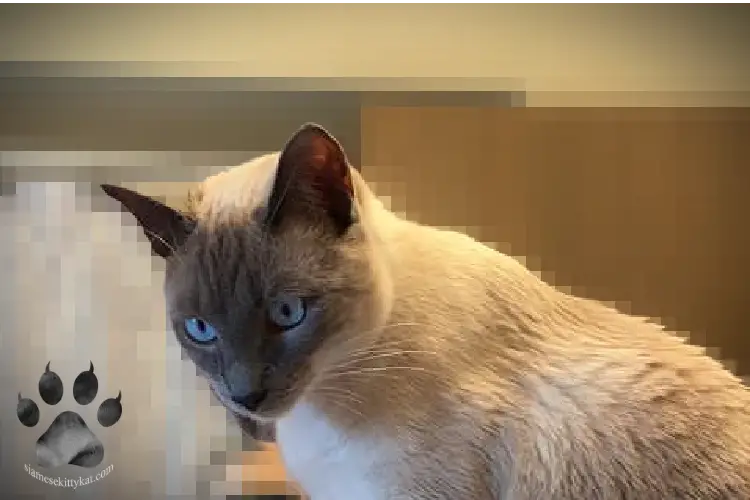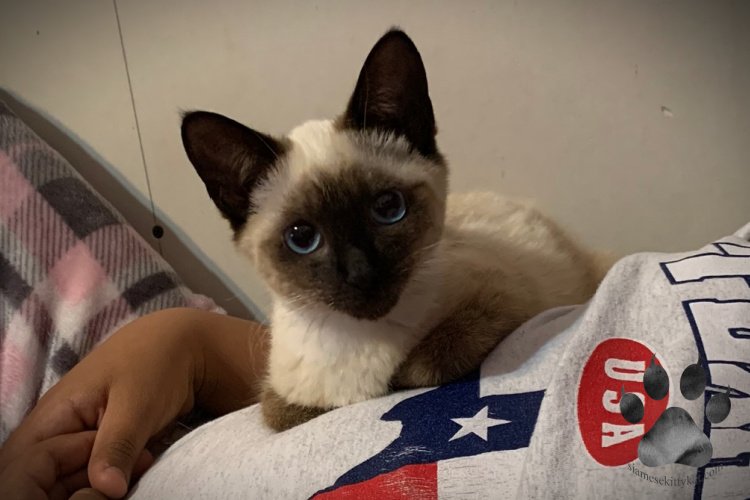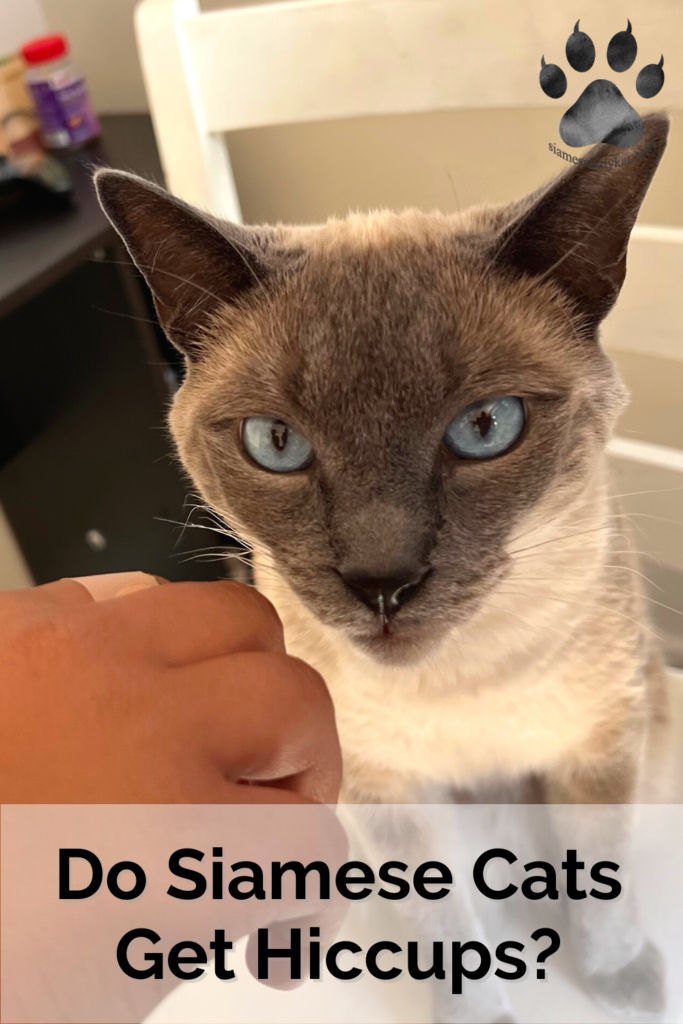An episode of hiccups from Siamese cats may sound funny, yet still odd. Why do these furry cuties get hiccups in the first place? Are the reasons the same for cats as for humans? But hold on a second, is it true? Do Siamese cats get hiccups?
Siamese cats can get hiccups. Hiccups often happen to all kinds of cats. If your Siamese cat makes a weird gulping move, that’s when your furry feline has hiccups. In general, hiccups in cats are harmless. But if your cat has persistent hiccups, it could be a sign of a health concern.
Siamese cats’ typical hiccups intrigue us cat parents. After all, Siamese cats are infamous for their vocalizations.
Siamese cats get hiccups because they eat too fast and don’t chew well. Also, they aren’t drinking enough water or have trouble with hairballs. Most of the time, your Siamese cat’s hiccups are harmless. Cat hiccups usually go away on their own.
It’s better to ensure nothing is wrong with your cat’s health. Long-lasting hiccups may mean heart disease or feline asthma. If your cat’s hiccups linger for many days and seem to hurt or last more than a few weeks, bring your cat to the vet.
Here’s some good information about what might cause hiccups in Siamese cats. Read on for tips on what to do when your furry pal gets hiccups!
How to know if my Siamese cat has hiccups?
Hiccups are pretty common in Siamese cats. If you have a Siamese cat, you might be wondering how to tell if he has hiccups.
It’s not always clear if your Siamese cat has hiccups. The good news is that a slight chirping sound isn’t the only sign your cat has hiccups; there are other hints. Not all cats will show all the clues listed below. Also, most cats will have more than one sign.
Here are the clues you can watch out for to know if your cat has them:
How does a cat’s hiccup sound?
Siamese cats make a “chirping” sound when they hiccup. Cat hiccups, at most, don’t sound the same as human hiccups. The sound of a cat’s hiccup is more like a quiet squeak. It sounds like something is in the cat’s throat while breathing. Sometimes, you can’t even hear a sound when a cat hiccups.
Are cat hiccups bad?
I have long wondered if cat hiccups are harmful or not. After talking with a vet, I learned that you should not worry immediately. It is pretty standard for all kinds of cats to get hiccups once in a while.
Make sure everything is okay with your Siamese cat. You’ll have more peace of mind when you know your feline pal is doing fine and in tip-top condition. But if your cat hiccups often and for a long time, you should still take it to the vet.
What does it mean when my Siamese cat has hiccups?

It can be a concern when your cat has hiccups. Despite being familiar and harmless, it still warrants further investigation. Here are some explanations for why your cat has hiccups. Plus tips on what to do or how to assist your furry feline!
I was typing away on my laptop when I heard a strange yet familiar sound. I turned to find Robyn having hiccups in front of her water bowl. The water bowl was empty! I was so focused on the work that I had forgotten to refill it. I filled the bowl with water and waited as Robyn drank it. I realized Robyn must be so thirsty that she got the hiccups.
Cats need more than twice as much water as their food every day. Cats have trouble having the right amount of water in one drink because of their tongues’ shapes. According to Nestle Purina, a cat can only get 3/100 teaspoons of water from one lap. Your cat is less likely to get hiccups if it stays well hydrated.
How to assist / What to do:
1. Always keep your cat’s water bowl full. Your Siamese cat should always have access to clean, fresh water.
2. Don’t forget to keep the bowls’ water clean. Cats love fresh and clean water. Your Siamese cat’s water bowl can get dirty with dust and other things. You should change the water twice a day.
I put up several bowls of water in different parts of our house. I can see that Batman and Robyn each have favorite water bowls (as does your cat, I’m sure!). But I still put up many bowls to ensure that my cats have ample access to them.
3. Wet cat food is another way to ensure your cat stays hydrated. It holds liquids that cats can consume. There are many kinds of wet food to go with the texture of dry kibble. Find out what your cat will like best.
Most of the time, cats get hiccups because they eat too much or too fast. Cats often don’t chew their food well enough, which makes them swallow too much air. The air then causes spasms in the diaphragm.
How to assist / What to do:
1. Give your furry baby small meals throughout the day instead of big meals in one or two days. I give my cats food in small amounts while I get ready for work in the morning. Then, in the evening, while we’re preparing for dinner.
2. Buy a slow-feeding bowl for your cat. A slow-feeding bowl is different from other bowls because it has bumps and ridges on the bottom. This way, your cat will eat at a slower pace. This bowl is an excellent way to keep your cat from getting bored.
3. Turn feeding time into feeding slash game time, as well! Some toys release dry cat food when your cat plays with them. You can try puzzle feeders too! You put food in the puzzle feeder, and your cat must figure out the puzzle to get to it.
Many cats spend a good amount of their day scratching and then grooming. Cats get hairballs when they groom themselves and swallow the hair they pull out. Most of the time, the hair passes through the cat’s throat and into the stomach.
Your Siamese cat can get hiccups when those nasty hairballs irritate the throat. Your cat stretches out and gags until the hairball comes up. Then your furry baby keeps coughing to vomit or get rid of the hairball. The coughing can cause your cat to swallow air, making your kitty hiccup.
How to assist / What to do:
1. Brush your cat at least once a week.
2. Use a digestive aid to help get rid of hairballs. With a digestive lubricant, our cats won’t vomit hairballs. They’ll pass hairballs in the litter box instead.
I once gave Robyn Laxatone lubricant gel. She felt better afterward, and she loved the way the gel tasted. Vets like and recommend this product too.
3. Seek immediate veterinary care as soon as possible. If your cat can’t still cough up the hairball, it could mean the hairball has moved into the intestines. This hairball issue may be severe.

Thread, rubber bands, wool, and small toys are all things cats like to eat. We have no idea why. If only we could ask them, right? It’s normal for us cat owners to find all sorts of items in our cat’s vomit or stool. But you should be careful. Some foreign things can cause digestive problems in cats.
How to assist / What to do:
1. Call your vet if your Siamese cat ate something foreign. The digestive tract of a cat takes 10-24 hours to pass through. Swallowed foreign objects can be uncomfortable and harmful for your cat.
2. Seek advice from a vet on the potential dangers of internal blockages. If the foreign object can’t go up, it must come out! Your vet can perform an endoscopy if your cat can’t throw up or pass out the thing.
Recurrent episodes of hiccups could be a sign of feline asthma. After the hiccups, your cat breathes deep through an open mouth and coughs. Also, if your cat’s hiccups sound like choking, they may show swollen airways.
Feline asthma is allergen-driven. It causes labored breathing and can even risk a cat’s life. Dust, home detergents, cigarette smoke, and cat litter particulates can trigger feline asthma.
How to assist / What to do:
1. Keep things like air fresheners, laundry detergent, and perfume away from your cat.
2. Use cat litter made of wood or paper with no added scent. Your cat should avoid clay litter. It makes more dust.
4. Use an air cleaner or purifier to cut mold spores in the air.
3. Vacuum more often to get rid of more dust and mites.
If an older cat has been hiccuping for a long time, it could be a sign of heart disease. But this is not something that happens all too often.
The most obvious sign is a cat’s sudden paralysis in the back legs. A blood clot forms and pushes out of the aorta in a cat with heart disease. The clot prevents blood from reaching the rear legs.
How to assist / What to do:
1. Take your cat to the veterinarian if lethargy occurs after the hiccups.
2. Visit the vet with your cat for a complete physical examination. The examination includes testing stool samples and parasites.
3. Always keep up with your cat’s vaccinations.
4. Call for one if a health issue emerges between scheduled visits.
Siamese cats can get hiccups. Most of the time, there’s no need to worry about hiccups. But you should always check on your Siamese cat to see if anything else strange is going on. Hiccups shouldn’t go on for more than a day. If it persists, consult your vet.
Siamese cats rarely give their owners reason to worry about hiccups. We cat parents can take comfort in that fact. What a relief! Thanks for reading!
We gathered all the health tips tailored toward maintaining your Siamese cat’s optimal well-being. Check it out here: Siamese Cat Health: A Complete Guide
Get your FREE Siamese Cat 2025 Printable Calendar

